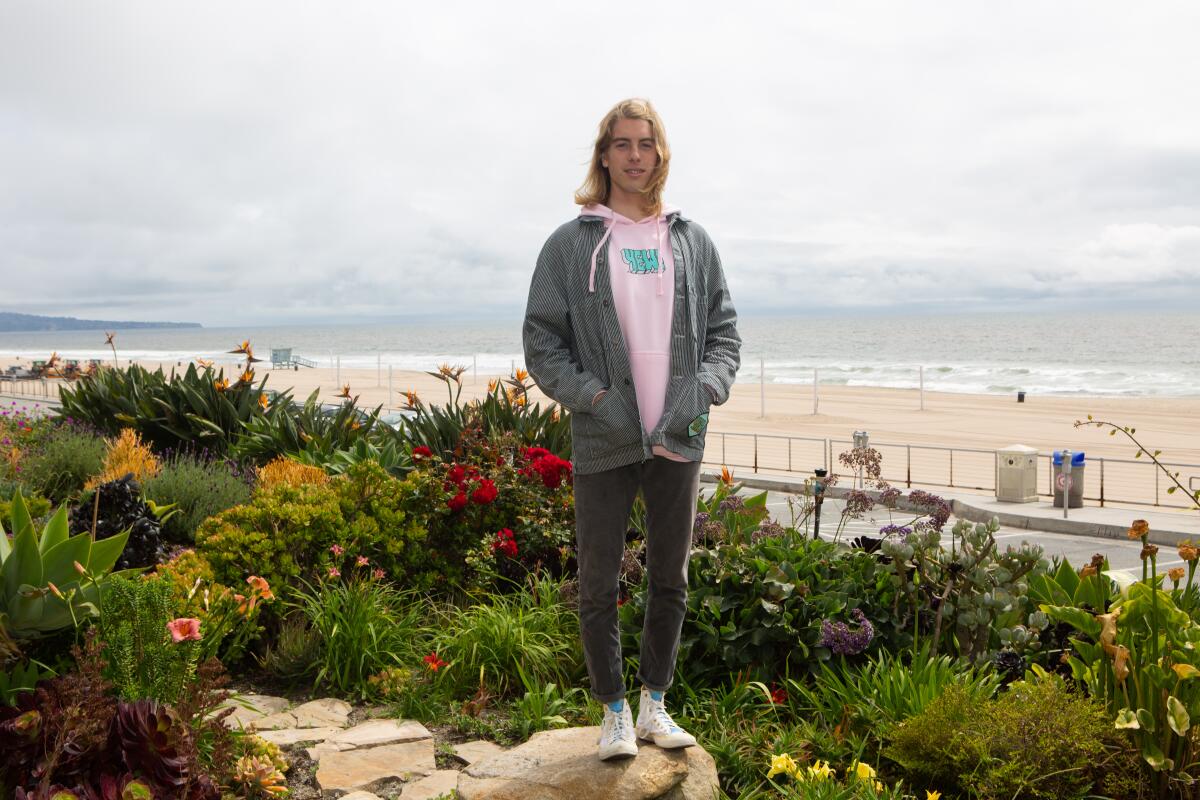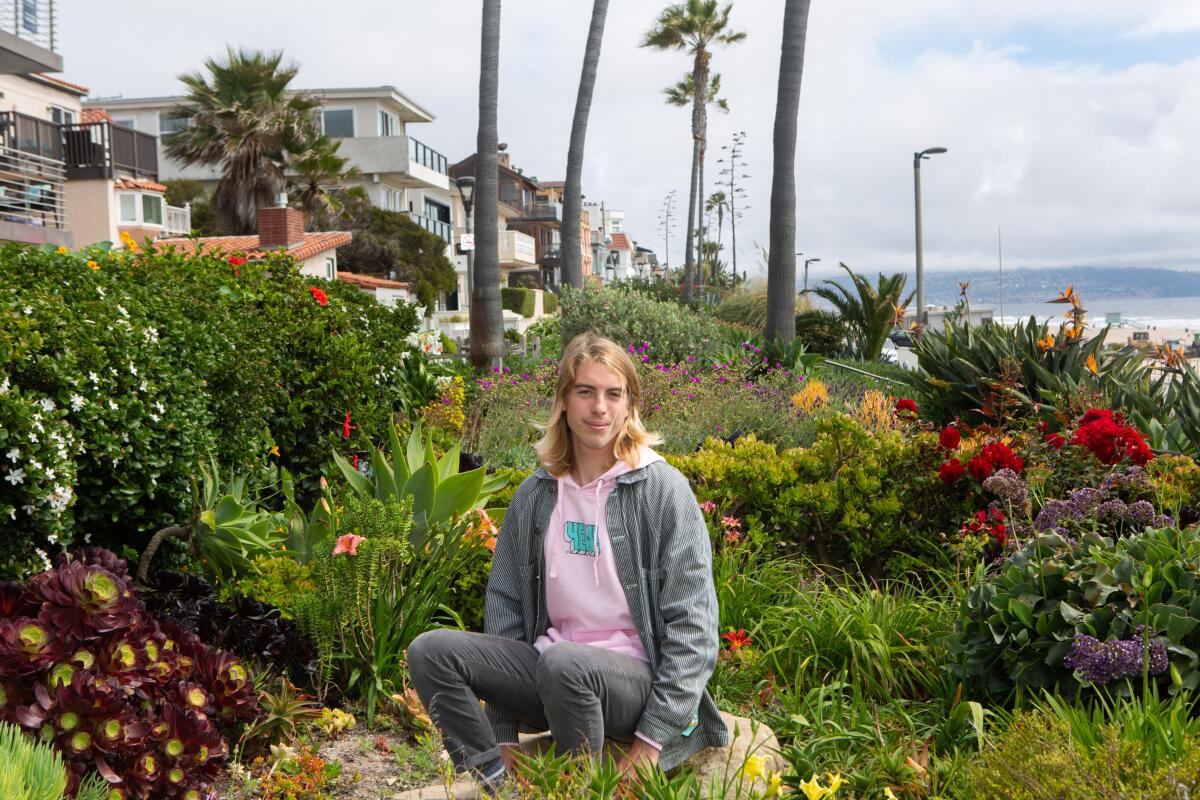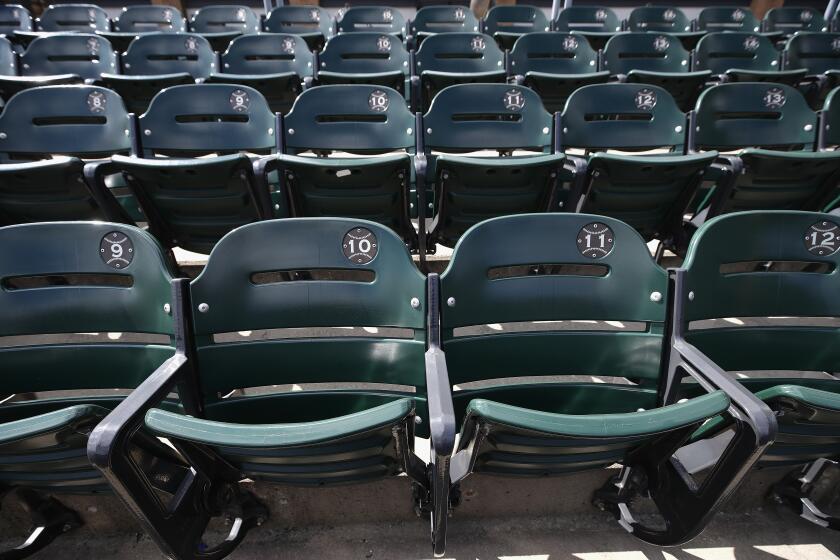Column: How hockey, surfing and soap made one college student a natural role model

Hogan Peters considered himself a hockey player who surfed. Or was he a surfer who played hockey?
Transferring from Hobart College in upstate New York to Loyola Marymount late in 2018 allowed Peters to ponder that question while he pursued both passions. And rode plenty of waves — some of them, to his surprise, on land.
Driven by concerns about the harmful ingredients in the wax he used to strengthen his grip on his surfboard and enhance control of the puck on his hockey stick, Peters invented an environmentally friendly alternative and sold it through his Manhattan Beach-based company YEW! (Your Environment’s Wax).
The market dried up when the coronavirus outbreak halted sports activities, but his need for hand sanitizer and his reluctance to waste wax-making materials triggered an “aha!” moment. He devised a formula for making soap, and he has given several hundred bars to El Camino College’s Warrior Pantry for students who struggle to buy food and toiletries.
Major League Baseball owners have given the go-ahead on a proposal to the players’ union that could lead to the coronavirus-delayed season starting in July.
For Peters, 23, producing and donating soap is a way to pay back a community that quickly and warmly embraced him. “Coming from New York and being out here and seeing how close-knit everyone was I definitely wanted to be a part of it,” he said, “and now with this happening I think it’s great to see everyone come together in some capacity.”
Assigned to imagine and write about a sustainable project in an environmental science class at Loyola Marymount, Peters decided instead to create something. That night, he said, he was about to place an online order for Mr. Zog’s Sex Wax — which is used to coat the deck of surfboards — but paused when he saw it included ingredients he judged unfriendly to the environment. (The company acknowledges environmental concerns on its website at www.sexwax
“It was such a niche market, millions of surfers and millions of hockey players,” Peters said. “I was a hockey player and used it on my sticks. That was the thing. I was a dual athlete using a product that was harmful to the environment. So I said, ‘Something needs to be done about this.’
“I believe that we all have the opportunity to make a change, but at the same time, I wasn’t about to say I’m going to beat a company like Sex Wax. But small changes lead to big changes. What’s a small company I can start in my dorm room and try to make a change?”

He wanted to make a wax that didn’t have paraffin, which is derived from petroleum or shale and isn’t a renewable resource. After hundreds of attempts in his dorm room — and a few run-ins with security personnel curious about what he was doing with so many microwaves after he moved into an apartment for his senior year — Peters hit on a winner.
It’s all about the bees, and beeswax. He also uses cinnamon and kosher glycerine, keeping everything natural.
“Honeybee populations are dying at a very fast rate globally, especially in the United States. Beekeepers are at the front lines helping to sustain these populations, but not all beekeepers,” Peters said in a phone interview. “There are beekeepers who use pesticides. There’s bad guys in the beeswax market, but the good guys in the beeswax market, they’re working with government officials and they’re stopping pesticide sprays not only on their farms, but they’re trying to fight it globally.
“We buy beeswax from the most sustainable beekeepers around, so every time someone buys a bar they are directly helping the honeybee populations. On top of that, when they put it on their boards, they are no longer raising carbon dioxide levels in the ocean.”
Using natural materials, he said, also reduces surfers’ risk of absorbing harmful substances through the skin. “So not only are our bars helping the honeybees, they’re helping the oceans and kids, adults, anyone,” he said. “And the whole point with all this was me sitting in a dorm room coming out here [thinking], ‘Let’s do something for the environment but let’s also make it simple.’”
Dr. Anthony Fauci thinks the ability to test for the coronavirus will improve by the fall so the NFL could hold its season, even amid another outbreak.
Switching from making wax to making soap wasn’t easy. “I burned the first batch. The second batch was not soap. There were no bubbles that came out of it,” he said. “It felt like wax but it wasn’t sticky. And then third time’s the charm. I finally got it down.”
He offered his first 200 bars to a few community programs in the South Bay, but his limited production ability made it tough to find a good fit. The Manhattan Beach Chamber of Commerce hooked him up with El Camino College. “As much as I wish I could give it to everyone, for the time being I saw them being my age and I wanted to help,” Peters said. “If I could, I would make thousands of these bars and it wouldn’t just be El Camino College.”
Peters plans to continue making his soap even after restrictions are eased on outdoor activities and everyone can again take to the water and the ice. He began making the hockey wax only three months ago and was preparing to meet with Kings representatives to discuss selling it in the pro shop of the team’s El Segundo practice facility when the coronavirus shut things down. He hopes to get another chance when things open up again.
He didn’t set out to be a role model but has shown what determination and vision can accomplish, whether on a surfboard or hockey skates, or both. “I’m enjoying the ride,” he said. “Fingers crossed, hoping for the best.”
More to Read
Go beyond the scoreboard
Get the latest on L.A.'s teams in the daily Sports Report newsletter.
You may occasionally receive promotional content from the Los Angeles Times.












